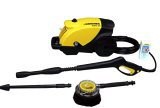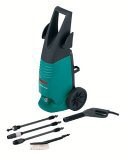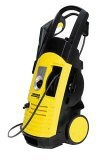
Pressure Washers
by Jake KenJo
Pressure Washer, power washer, jet washer, water blaster, call it what you will these are all different names for essentially the same type of machine. The pressure washer is finding its way into houses all over the country as a quick convenient and arguably, an environmentally friendly means of cleaning all sorts of things around the home.

Karcher K520M Pressure Washer
How domestic electrically powered models work
Very simply is the answer. They generally have two connections. One connects the unit to the mains via a 3 pin plug. The other connects to your water supply with a normal garden hose. When you squeeze the trigger on the lance a motor runs a pump which pushes the water through the washer hose and lance at high pressure. That about sums it up.
Types
They are usually rated by motor size and pressure capability. Pressure is most often quoted in Bar. Motor size is quoted in Watts. With both Bar and Watts the bigger the number, the more powerful the machine will be and the better it will clean. They are also sometimes classified by duty such as;
- Light Duty being the 100 bar models
- Medium duty being the 100 to 110 bar models
- Heavy duty being the 110 to 130 bar models
Uses
The use of these machines is limited only by the imagination of the user. Here are just some of the typical cleaning uses around the home;
Garden furniture, bbq’s, decking, patios, driveways, cars, motorcycles, caravan, boats, drains, rubbish bins, lawnmowers, garden tools, fences, brickwork, guttering, animal pens, exterior paintwork removal, and even shot blasting using special attachments.

Bosch Aquatak 110 Plus
Comfort Pressure Washer
Water Usage
With environmental issues high on the political and social agenda these days water usage is something we should all be conscious of. According to Thames Water for instance they aim to supply domestic premises with water at a pressure of 1 bar and a flow rate of 9 litres per minute. If we use this figure as a basis for calculations, an unrestricted domestic hose would therefore use 9*60=540 litres of water per hour which is nearly 119 gallons per hour, an awful lot of water.
According to leading manufacturer Karcher, a pressure washer will use on average around 50%-70% of the water a hosepipe uses. This is a fairly good argument to suggest that sensible use of a pressure washer without detergents could be regarded as environmentally friendly and could actually save you money on your water bill.
Things to consider before buying
- How portable do you need it to be – one with wheels is recommended as they can be heavy
- What accessories do you need – a car cleaning kit for example?
- Whether or not you want to use detergent with it
Safety
Always wear eye protection when using the machine and never operate a machine without first reading the manufacturer’s instructions.

Karcher K6.85M Upright
Domestic Pressure Washer
In Summary
Pressure washers are a convenient and easy to use tool that has a multitude of cleaning uses around the home. For most versatility buy the highest rated machine you can and make sure it has wheels to save your back. As regards makes and models, the better known household names produce machines with more reliable motors but my experience to date is that the longevity of a shops own branded machine can be as good as that of the major brands if chosen wisely.
You can find a good selection of pressure washers from Karcher, Bosch and others at Tooled Up, Robert Dyas and Amazon.co.uk
Jake KenJo writes on Home and Garden Topics.
Wooden Gazebos
Garden Shredders
Gardening Equipment Online